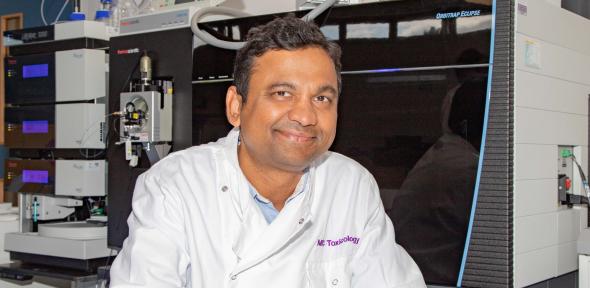
Submitted by Rachel Fellows on Mon, 14/07/2025 - 09:52
It was announced today that Dr Kiran Patil, Principal Investigator at the MRC Toxicology Unit, has been awarded €150,000 from the European Research Council (ERC) to develop novel live biotherapeutics for boosting cancer therapy.
In this ERC funded project, Kiran’s group will use their expertise in microbial co-evolution to develop a new type of probiotic to improve cancer therapy response rates. Using a unique platform developed in the ERC project ModEM, they plan to enhance the ability of gut bacteria to produce metabolites that increase the effectiveness of chemotherapeutics.
Cancer treatments have advanced significantly in the past few decades, but not all patients respond due to differences in factors such as genetics, metabolism and microbiome composition. This means that a significant number of patients experience the toxic effects of cancer therapy, without any benefit. Translating inter-individual variability into more personalised treatments is a complex challenge but recent findings may help to provide a solution.
Kiran along with Nicola Gangliani and collaborators at the University Medical Centre Hamburg-Eppendorf identified that certain metabolites naturally produced by gut bacteria could improve the effectiveness of chemotherapy. The Metabolically Enhanced Lactic Acid Bacteria for Boosting Cancer Therapy (MELAB) project will use an approach different from current microbial therapies.
They plan to adapt lactic acid bacteria, species that are safe for humans, into a microbial based therapy or biotherapeutic that allows patients to respond better to chemotherapy. Dr Patil said, “Next generation probiotics provide an elegant solution to the problem of anti-cancer drug resistance, working as biotherapeutics that release beneficial metabolites directly into the gut in a steady and continuous manner. This ERC funding will help us translate these promising research findings into products for patient benefit.”
Patil’s project is one of 150 proposals from across Europe that have been selected for funding as part of the EU’s research and innovation program Horizon Europe, with a total of €22.5 million awarded. Research projects cover a broad range of topics including creating a portable device to capture and detect PFAS (forever chemicals), using new approaches to overcome drug resistance in triple-negative breast cancer and creating a sustainable alternative for paracetamol production. These ERC proof of concept grants bridge the gap between pioneering research results and the early phases of commercialisation or society application.
Congratulations to Dr Patil on receiving this prestigious grant award and for this exciting project. Read more about the ERC Proof of Concept Grants here.


